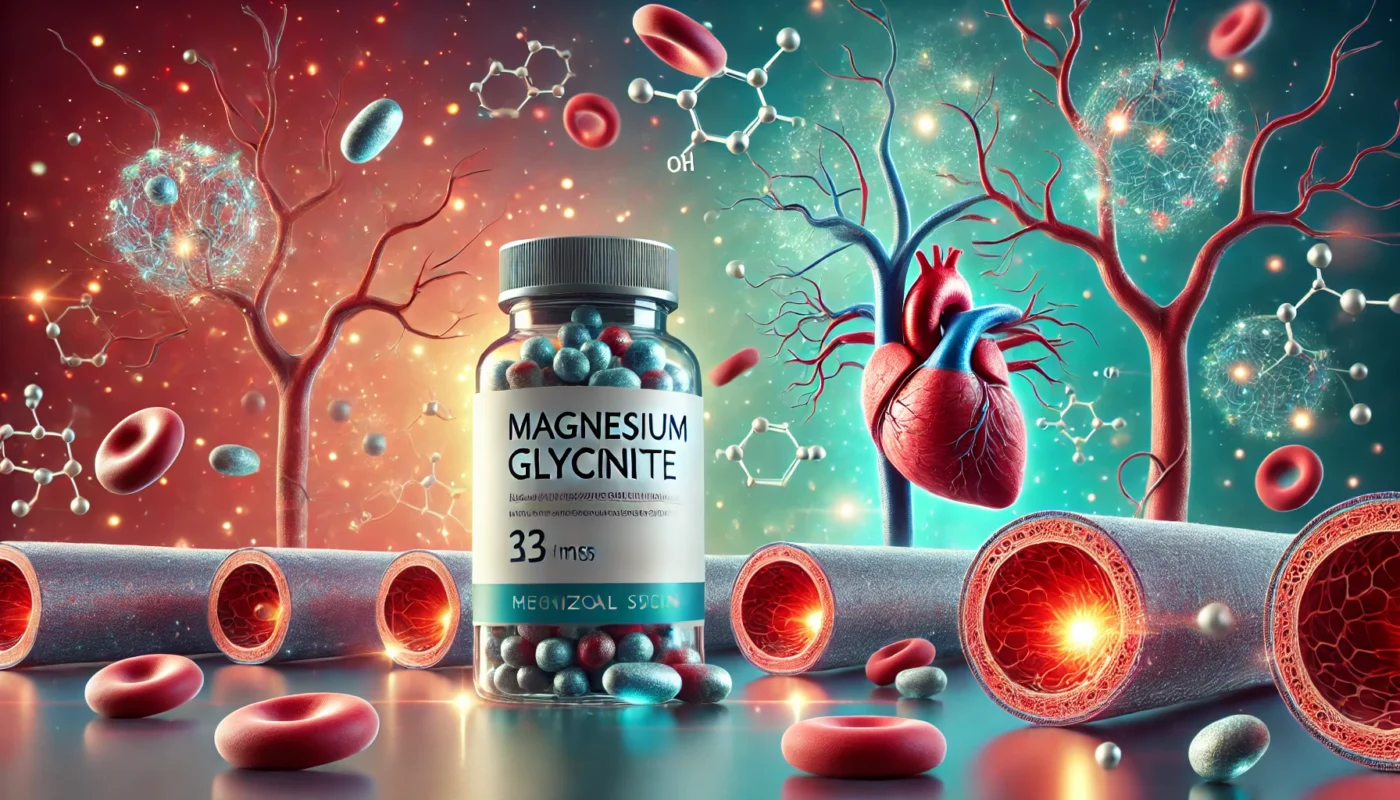The health of your blood vessels is critical to your overall cardiovascular function. Flexible, elastic blood vessels are essential for maintaining healthy blood pressure, promoting efficient circulation, and reducing the risk of vascular diseases such as atherosclerosis and hypertension. Magnesium glycinate, a highly bioavailable form of magnesium, has emerged as a powerful supplement for supporting blood vessel health. By enhancing blood vessel elasticity, regulating blood pressure, and reducing inflammation, magnesium glycinate offers a natural and effective approach to vascular wellness. This article delves into the science behind magnesium glycinate’s benefits for blood vessel health and its potential to reduce vascular disease risks.
You May Also Like:
The Role of Magnesium Glycinate in Cellular Detoxification: Here’s the Science
How Magnesium Glycinate Affects Blood-Brain Barrier Integrity: Here’s What to Know
The Role of Magnesium in Cardiovascular Health
Magnesium is a vital mineral involved in over 300 enzymatic reactions, many of which directly affect cardiovascular function. It regulates vascular tone, modulates inflammation, and supports the structural integrity of blood vessels. Despite its importance, magnesium deficiency is widespread, affecting nearly 50% of adults in developed countries (Rosanoff et al., 2012). This deficiency contributes to the development of hypertension, arterial stiffness, and other vascular complications.
Understanding Magnesium Glycinate
Magnesium glycinate is a chelated form of magnesium in which the mineral is bound to glycine, an amino acid. This formulation enhances magnesium absorption and minimizes gastrointestinal side effects, making it an ideal choice for individuals looking to support blood vessel health.
Key Benefits of Magnesium Glycinate
- High Bioavailability: Magnesium glycinate is more effectively absorbed than magnesium oxide or sulfate.
- Calming Effects: Glycine contributes to stress reduction, which can indirectly support vascular health by lowering cortisol levels.
- Minimal Side Effects: Magnesium glycinate is less likely to cause diarrhea compared to other magnesium supplements.

How Magnesium Glycinate Supports Blood Vessel Health
1. Enhancing Blood Vessel Elasticity
Elasticity allows blood vessels to expand and contract as needed, maintaining healthy blood flow and preventing damage to the arterial walls.
- Research Insight: A study published in Hypertension Research (2018) found that magnesium supplementation improved arterial elasticity by 18% in individuals with hypertension.
- Mechanism: Magnesium regulates calcium and potassium ion transport in vascular smooth muscle cells, preventing excessive contraction and promoting relaxation. This effect helps maintain the flexibility of arterial walls.
2. Regulating Blood Pressure
Magnesium plays a crucial role in blood pressure regulation by acting as a natural calcium channel blocker. It prevents the excessive contraction of blood vessels, which can elevate blood pressure.
- Clinical Evidence: A meta-analysis in Hypertension (2017) revealed that magnesium supplementation reduced systolic blood pressure by an average of 4 mmHg and diastolic blood pressure by 2.5 mmHg in individuals with hypertension.
- Broader Impact: Lower blood pressure reduces the risk of vascular diseases such as stroke and heart attack.
3. Reducing Inflammation in Blood Vessels
Chronic inflammation damages blood vessel walls and promotes the formation of atherosclerotic plaques. Magnesium reduces inflammatory markers such as C-reactive protein (CRP) and interleukin-6 (IL-6).
- Study Findings: Research in The Journal of Clinical Endocrinology & Metabolism (2020) showed that magnesium supplementation reduced CRP levels by 25%, demonstrating its anti-inflammatory effects.
- Implications for Vascular Health: By reducing inflammation, magnesium helps prevent the progression of vascular diseases and supports overall arterial health.
4. Preventing Arterial Calcification
Arterial calcification, a condition where calcium deposits stiffen the arterial walls, is a significant risk factor for cardiovascular disease. Magnesium inhibits the deposition of calcium in blood vessels, preserving their elasticity.
- Statistics: A study in The Journal of the American Heart Association (2019) found that individuals with higher magnesium intake had a 34% lower risk of arterial calcification compared to those with lower intake.
5. Improving Endothelial Function
The endothelium, the inner lining of blood vessels, plays a critical role in vascular health. Magnesium enhances the production of nitric oxide (NO), a molecule that relaxes blood vessels and improves blood flow.
- Clinical Insight: A 2021 study in Nutrients reported that magnesium supplementation increased NO production by 30%, improving endothelial function in patients with metabolic syndrome.

Dietary Sources of Magnesium
In addition to supplementation, incorporating magnesium-rich foods into your diet can support vascular health. Excellent sources include:
- Leafy Greens: Spinach, kale, and Swiss chard.
- Nuts and Seeds: Almonds, cashews, pumpkin seeds, and sunflower seeds.
- Whole Grains: Brown rice, quinoa, and oats.
- Legumes: Lentils, black beans, and chickpeas.
- Fish: Salmon and mackerel.
However, dietary intake often falls short due to soil depletion and food processing. Magnesium glycinate supplementation ensures consistent and effective magnesium levels, especially for individuals at risk of cardiovascular diseases.
Recommended Dosage and Safety
The recommended dietary allowance (RDA) for magnesium is:
- Adult Men: 400–420 mg/day
- Adult Women: 310–320 mg/day
Therapeutic doses of magnesium glycinate for cardiovascular health typically range from 200–400 mg/day, depending on individual needs.
Safety Considerations
- Magnesium glycinate is generally well-tolerated, but excessive intake can cause mild gastrointestinal symptoms.
- Individuals with kidney disease or severe medical conditions should consult a healthcare provider before supplementation.

Magnesium Glycinate and Risk Reduction for Vascular Disease
Magnesium glycinate’s ability to support blood vessel elasticity, reduce blood pressure, and mitigate inflammation makes it a valuable tool for preventing vascular diseases. Conditions that may benefit from magnesium glycinate supplementation include:
- Hypertension: Magnesium’s effects on blood vessel relaxation and blood pressure regulation can significantly reduce the risk of complications such as stroke and heart attack.
- Atherosclerosis: By preventing arterial calcification and reducing inflammation, magnesium glycinate helps slow the progression of atherosclerosis.
- Peripheral Artery Disease (PAD): Improved circulation and reduced arterial stiffness support the management of PAD.
- Metabolic Syndrome: Enhanced insulin sensitivity and nitric oxide production contribute to better vascular outcomes in individuals with metabolic syndrome.
Practical Tips for Using Magnesium Glycinate
- Take with Meals: Magnesium glycinate is best absorbed when taken with food.
- Combine with Other Nutrients: Pair magnesium with vitamin D and omega-3 fatty acids for synergistic effects on cardiovascular health.
- Stay Hydrated: Proper hydration enhances magnesium metabolism and supports blood vessel function.
- Monitor Progress: Track improvements in blood pressure, inflammation markers, and overall cardiovascular health to assess the supplement’s effectiveness.
The Future of Magnesium Glycinate in Cardiovascular Research
Emerging studies highlight magnesium glycinate’s potential as a cornerstone of cardiovascular health. Areas of future focus include:
- Personalized Nutrition: Genetic testing may identify individuals who benefit most from magnesium supplementation.
- Combination Therapies: Research on magnesium’s synergy with other supplements, such as Coenzyme Q10 and L-arginine, for vascular health.
- Long-Term Effects: Evaluating the sustained benefits of magnesium glycinate on arterial elasticity and vascular disease prevention.
Conclusion: Magnesium Glycinate for Lifelong Vascular Health
Magnesium glycinate offers a natural and scientifically supported solution for improving blood vessel health and reducing the risks of vascular disease. Its ability to enhance arterial elasticity, regulate blood pressure, and combat inflammation makes it an essential tool for maintaining cardiovascular wellness.
By incorporating magnesium glycinate into a comprehensive health plan, individuals can take proactive steps to protect their blood vessels and reduce the risk of life-threatening vascular conditions. For those seeking to optimize their cardiovascular health, magnesium glycinate is a safe, effective, and practical choice.

References
- The Effect of Magnesium Supplementation on Endothelial Function: A Randomised Cross-Over Pilot Study. Retrieved from: https://pmc.ncbi.nlm.nih.gov/articles/PMC8346147/
- Impact of Inducible Nitric Oxide Synthase Activation on Endothelial Behavior under Magnesium Deficiency. Retrieved from: https://pmc.ncbi.nlm.nih.gov/articles/PMC11124182/
- High concentrations of magnesium modulate vascular endothelial cell behaviour in vitro. Retrieved from: https://pubmed.ncbi.nlm.nih.gov/15158908/
- The Role of Magnesium in Hypertension and Cardiovascular Disease. Retrieved from: https://pmc.ncbi.nlm.nih.gov/articles/PMC8108907/
- Suboptimal magnesium status in the United States: are the health consequences underestimated? Retrieved from: https://pubmed.ncbi.nlm.nih.gov/22364157/
- Magnesium Intake Is Inversely Associated With Coronary Artery Calcification. Retrieved from: https://pmc.ncbi.nlm.nih.gov/articles/PMC3957229/
- The Effect of Magnesium Supplementation on Endothelial Function: A Randomised Cross-Over Pilot Study. Retrieved from: https://pmc.ncbi.nlm.nih.gov/articles/PMC8346147/
Important Note: The information contained in this article is for general informational purposes only, and should not be construed as health or medical advice, nor is it intended to diagnose, prevent, treat, or cure any disease or health condition. Before embarking on any diet, fitness regimen, or program of nutritional supplementation, it is advisable to consult your healthcare professional in order to determine its safety and probable efficacy in terms of your individual state of health.
Regarding Nutritional Supplements Or Other Non-Prescription Health Products: If any nutritional supplements or other non-prescription health products are mentioned in the foregoing article, any claims or statements made about them have not been evaluated by the U.S. Food and Drug Administration, and such nutritional supplements or other health products are not intended to diagnose, treat, cure, or prevent any disease.

